Śrīmad-Bhāgvatam – Canto 4
(Q&A Format)
Lord Shiva is the spiritual master of everyone, both the dull and demoniac and the highly learned vaisnavas.
Lord Shiva is described here as caracara-guru, the spiritual master of all animate and inanimate objects. He is sometimes known as Bhutanatha, which means “the worshipable deity of the dull-headed.” Bhuta is also sometimes taken to indicate the ghosts. Lord Shiva takes charge of reforming persons who are ghosts and demons, not to speak of others, who are godly; therefore he is the spiritual master of everyone, both the dull and demoniac and the highly learned Vaisnavas. It is also stated, vaisnavanam yatha sambhuh: Sambhu, Lord Shiva, is the greatest of all Vaisnavas. On one hand he is the worshipable object of the dull demons, and on the other he is the best of all Vaisnavas, or devotees, and he has a sampradaya called the Rudra-sampradaya. Those who do not regularly bathe are supposed to be in association with ghosts and crazy creatures. Lord Shiva appeared to be like that, but his name, Shiva, is actually fitting, for he is very kind to persons who are in the darkness of the mode of ignorance, such as unclean drunkards who do not regularly bathe. Lord Shiva is so kind that he gives shelter to such creatures and gradually elevates them to spiritual consciousness. Although it is very difficult to raise such creatures to spiritual understanding, Lord Shiva takes charge of them, and therefore, as stated in the Vedas, Lord Shiva is all-auspicious. Thus by his association even such fallen souls can be elevated. Sometimes it is seen that great personalities meet with fallen souls, not for any personal interest but for the benefit of those souls. In the creation of the Lord there are different kinds of living creatures. Some of them are in the mode of goodness, some are in the mode of passion, and some are in the mode of ignorance. Lord Vishnu takes charge of persons who are advanced Krishna conscious Vaisnavas, and Lord Brahma takes charge of persons who are very much attached to material activities, but Lord Shiva is so kind that he takes charge of persons who are in gross ignorance and whose behavior is lower than that of the animals. Therefore Lord Shiva is especially called auspicious.
Source: A.C. Bhaktivedanta Swami Prabhupada (2014 edition), “Srimad Bhagavatam”, Fourth Canto, Chapter 02 – Text 02 & 15
The curse of daksa (father-in-law of Shiva) was indirectly a blessing for Shiva.
It was due to the curse of Daksa, Shiva was deprived of his share in the oblations of Vedic sacrifices. Sri Visvanatha Cakravarti comments in this connection, that Lord Shiva was saved from the calamity of taking part with other demigods, who were all materialistic. Lord Shiva is the greatest devotee of the Supreme Personality of Godhead, and it is not fitting for him to eat or sit with materialistic persons like the demigods. Thus the curse of Daksa was indirectly a blessing, for Shiva would not have to eat or sit with other demigods, who were too materialistic. There is a practical example set for us by Gaurakisora dasa Babaji Maharaja, who used to sit on the side of a latrine to chant Hare Krishna. Many materialistic persons used to come and bother him and disturb his daily routine of chanting, so to avoid their company he used to sit by the side of a latrine, where materialistic persons would not go because of the filth and the obnoxious smell. However, Gaurakisora dasa Babaji Maharaja was so great that he was accepted as the spiritual master of such a great personality as His Divine Grace Om Vishnupada Sri Srimad Bhaktisiddhanta Sarasvati Gosvami Maharaja. The conclusion is that Lord Shiva behaved in his own way to avoid materialistic persons who might disturb him in his prosecution of devotional service.
Source: A.C. Bhaktivedanta Swami Prabhupada (2014 edition), “Srimad Bhagavatam”, Fourth Canto, Chapter 02 – Text 18
Some of the followers of Lord Shiva imitate him and try to take intoxicants like ganja (marijuana).
Indulging in wine and meat, keeping long hair on one’s head, not bathing daily, and smoking ganja (marijuana) are some of the habits which are accepted by foolish creatures who do not have regulated lives. By such behavior one becomes devoid of transcendental knowledge. It is sometimes seen that devotees of Lord Shiva imitate the characteristics of Lord Shiva. For example, Lord Shiva drank an ocean of poison, so some of the followers of Lord Shiva imitate him and try to take intoxicants like ganja (marijuana). Here the curse is that if someone follows such principles he must become an infidel and turn against the principles of Vedic regulation. It is said that such devotees of Lord Shiva will be sacchastra-paripanthinah, which means “opposed to the conclusion of sastra, or scripture.” This is confirmed in the Padma Purana also. Lord Shiva was ordered by the Supreme Personality of Godhead to preach the impersonal, or Mayavada, philosophy for a particular purpose, just as Lord Buddha preached the philosophy of voidness for particular purposes mentioned in the sastras. Sometimes it is necessary to preach a philosophical doctrine which is against the Vedic conclusion. In the Shiva purana it is stated that Lord Shiva said to Parvati that in the Kali-yuga, in the body of a brahmana, he would preach the Mayavada philosophy. Thus it is generally found that the worshipers of Lord Shiva are Mayavadi followers.
Source: A.C. Bhaktivedanta Swami Prabhupada (2014 edition), “Srimad Bhagavatam”, Fourth Canto, Chapter 02 – Text 28 & 29
Sex life is insignificant in the spiritual world.
Whenever there is a nice atmosphere in the material world, immediately there is an awakening of the sexual appetite in the minds of materialistic persons. This tendency is present everywhere within this material world, not only on this earth but in higher planetary systems as well. In complete contrast with the influence of this atmosphere on the minds of the living entities within the material world is the description of the spiritual world. The women there are hundreds and thousands of times more beautiful than the women here in this material world, and the spiritual atmosphere is also many times better. Yet despite the pleasant atmosphere, the minds of the denizens do not become agitated because in the spiritual world, the Vaikuntha planets, the spiritualistic minds of the inhabitants are so much absorbed in the spiritual vibration of chanting the glories of the Lord that such enjoyment could not be surpassed by any other enjoyment, even sex, which is the culmination of all pleasure in the material world. In other words, in the Vaikuntha world, in spite of its better atmosphere and facilities, there is no impetus for sex life. As stated in Bhagavad-gita (2.59), param drstva nivariate: the inhabitants are so spiritually enlightened that in the presence of such spirituality, sex life is insignificant.
Source: A.C. Bhaktivedanta Swami Prabhupada (2014 edition), “Srimad Bhagavatam”, Fourth Canto, Chapter 06 – Text 30
The Supreme will is the ultimate judgement.
The Supreme Personality of Godhead is called the supreme will. It is by the supreme will that everything is happening. It is said, therefore, that not a blade of grass moves without the supreme will. Generally it is prescribed that performers of pious activities are promoted to the higher planetary systems, devotees are promoted to the Vaikunthas, or spiritual worlds, and impersonal speculators are promoted to the impersonal Brahman effulgence; but it sometimes so happens that a miscreant like Ajamila is immediately promoted to the Vaikunthaloka simply by chanting the name of Narayana. Although when Ajamila uttered this vibration he intended to call his son Narayana, Lord Narayana took it seriously and immediately gave him promotion to Vaikunthaloka, despite his background, which was full of sinful activities. Similarly King Daksa was always engaged in the pious activities of performing sacrifices, yet simply because of creating a little misunderstanding with Lord Shiva, he was severely taken to task. The conclusion is, therefore, that the supreme will is the ultimate judgment; no one can argue upon this. A pure devotee therefore submits in all circumstances to the supreme will of the Lord, accepting it as all auspicious.
tat te ‘nukampam susamiksamano bhunjana evatma-krtam vipakam
hrd-vag-vapurbhir vidadhan namas te jiveta yo mukti-pade sa daya-bhak
(Bhag. 10.14.8)
The purport of this verse is that when a devotee is in a calamitous condition he takes it as a benediction of the Supreme Lord and takes responsibility himself for his past misdeeds. In such a condition, he offers still more devotional service and is not disturbed. One who lives in such a disposition of mind, engaged in devotional service, is the most eligible candidate for promotion to the spiritual world. In other words, such a devotee’s claim for promotion to the spiritual world is assured in all circumstances.
Source: A.C. Bhaktivedanta Swami Prabhupada (2014 edition), “Srimad Bhagavatam”, Fourth Canto, Chapter 06 – Text 45
In the beginning of creation Brahma created not only saintly sons but also demonic offspring.
It is understood herein that Adharma, Irreligion, was also a son of Brahma, and he married his sister Mrsa. This is the beginning of sex life between brother and sister. This unnatural combination of sex life can be possible in human society only where there is Adharma or Irreligion. It is understood that in the beginning of creation Brahma created not only saintly sons like Sanaka, Sanatana and Narada but also demonic offspring like Nirrti, Adharma, Dambha, and Falsity. Everything was created by Brahma in the beginning. Regarding Narada, it is understood that because his previous life was very pious and his association very good, he was born as Narada. Others were also born in their own capacities, according to their backgrounds. The law of karma continues birth after birth, and when there is a new creation, the same karma comes back with the living entities. They are born in different capacities according to karma even though their father is originally Brahma, who is the exalted qualitative incarnation of the Supreme Personality of Godhead.
From Dambha and Maya were born Greed and Nikrti, or Cunning. From their combination came children named Krodha (Anger) and Himsa (Envy), and from their combination were born Kali and his sister Durukti (Harsh Speech). By the combination of Kali and Harsh Speech were born children named Mrtyu (Death) and Bhiti (Fear). From the combination of Mrtyu and Bhiti came children named Yatana (Excessive Pain) and Niraya (Hell).
The creation takes place on the basis of goodness, but devastation takes place because of irreligion. That is the way of material creation and devastation. Here it is stated that the cause of devastation is Adharma or Irreligion. The descendants of Irreligion and Falsity, born one after another, are Bluffing, Cheating, Greed, Cunning, Anger, Envy, Quarrel, Harsh Speech, Death, Fear, Severe Pain, and Hell. All these descendants are described as signs of devastation. If a person is pious and hears about these causes of devastation, he will feel hatred for all these, and that will cause his advancement in a life of piety. Piety refers to the process of cleansing the heart. As recommended by Lord Chaitanya, one has to cleanse the dust from the mirror of the mind, and the advancement on the path of liberation begins. Here also the same process is recommended. Malam means: “contamination.” We should learn to despise all the causes of devastation, beginning from irreligion and cheating, and then we shall be able to make advancement in a life of piety. The possibility of our attaining Krishna consciousness will be easier, and we shall not be subjected to repeated devastation. The present life is repeated birth and death, but if we seek the path of liberation, we may be saved from repeated suffering.
Source: A.C. Bhaktivedanta Swami Prabhupada (2014 edition), “Srimad Bhagavatam”, Fourth Canto, Chapter 08 – Text 02 to 05
Changes in the mode of worship is permitted according to particular time, country & conveniences.
Om Namo bhagavate vasudevaya is known as the dvadasaksara-mantra. This mantra is chanted by Vaisnava devotees, and it begins with Pranava or Omkara. There is an injunction that those who are not Brahmanas cannot pronounce the Pranava mantra. But Dhruva Maharaja was born a ksatriya. He at once admitted before Narada Muni that as a ksatriya he was unable to accept Narada’s instruction of renunciation and mental equilibrium, which are the concern of a brahmana. Still, although not a brahmana but a ksatriya, Dhruva was allowed, on the authority of Narada, to pronounce the Pranava Omkara. This is very significant. Especially in India, the caste brahmanas object greatly when persons from other castes, who are not born in brahmana families, recite this Pranava mantra. But here is tacit proof that if a person accepts the Vaisnava mantra or Vaisnava way of worshiping the Deity, he is allowed to chant the Pranava mantra. In Bhagavad-gita, the Lord personally accepts that anyone, even one of a low species, can be elevated to the highest position and go back home, back to Godhead, simply if he worships properly.
The prescribed rules, as stated here by Narada Muni, are that one should accept the mantra through a bona fide spiritual master and hear the mantra in the right ear. Not only should one chant or murmur the mantra, but in front of him, he must have the Deity or physical form of the Lord. Of course, when the Lord appears it is no longer a physical form. For example, when an iron rod is made red-hot in a fire, it is no longer iron; it is fire. Similarly, when we make a form of the Lord–whether of wood or stone or metal or jewels or paint, or even a form within the mind–it is a bona fide, spiritual, transcendental form of the Lord. Not only must one receive the mantra from the bona fide spiritual master like Narada Muni or his representative in the disciplic succession, but one must chant the mantra. And not only must one chant, but he should also offer whatever foodstuff is available in his part of the world, according to time and convenience.
The method of worship–chanting the mantra and preparing the forms of the Lord–is not stereotyped, nor is it exactly the same everywhere. it is specifically mentioned in this verse that one should take consideration of the time, place and available conveniences. Our Krishna consciousness movement is going on throughout the entire world, and we also install Deities in different centers. Sometimes our Indian friends, puffed up with concocted notions, criticize, “This has not been done. That has not been done.” But they forget this instruction of Narada Muni to one of the greatest Vaisnavas, Dhruva Maharaja. One has to consider the particular time, country and conveniences. What is convenient in India may not be convenient in Western countries. Those who are not actually in the line of acaryas, or who personally have no knowledge of how to act in the role of acarya, unnecessarily criticize the activities of the ISKCON movement in countries outside of India. The fact is that such critics cannot do anything personally to spread Krishna consciousness. If someone does go and preach, taking all risks and allowing all considerations for time and place, it might be that there are changes in the manner of worship, but that is not at all faulty according to sastra. Srimad Viraraghava Acarya, an acarya in the disciplic succession of the Ramanuja-sampradaya, has remarked in his commentary that candalas, or conditioned souls who are born in lower than sudra families, can also be initiated according to circumstances. The formalities may be slightly changed here and there to make them Vaisnavas.
Lord Caitanya Mahaprabhu recommends that His name should be heard in every nook and corner of the world. How is this possible unless one preaches everywhere? The cult of Lord Caitanya Mahaprabhu is Bhagavata-dharma, and He especially recommends Krishna-Katha or the cult of Bhagavad-gita and Srimad-Bhagavatam. He recommends that every Indian, considering this task to be para-upakara or welfare activity, take the Lord’s message to other residents of the world. “Other residents of the world” does not refer only to those who are exactly like the Indian brahmanas and ksatriyas, or like the caste brahmanas, who claim to be Brahmanas because they were born in the families of Brahmanas. The principle that only Indians and Hindus should be brought into the Vaisnava cult is a mistaken idea. There should be propaganda to bring everyone to the Vaisnava cult. The Krishna consciousness movement is meant for this purpose. There is no bar to propagating the Krishna consciousness movement even among people who are born in candala, mleccha or yavana families. Even in India, this point has been enunciated by Srila Sanatana Gosvami in his book Hari-bhakti-vilasa, which is smrti and is the authorized Vedic guide for Vaisnavas in their daily behavior. Sanatana Gosvami says that as bell metal can turn to gold when mixed with mercury in a chemical process, so, by the bona fide diksa, or initiation method, anyone can become a Vaisnava. One should take initiation from a bona fide spiritual master coming in the disciplic succession, who is authorized by his predecessor spiritual master. I his is called diksa-vidhana. Lord Krishna states in Bhagavad-gita, vyapasritya: one should accept a spiritual master. By this process, the entire world can be converted to Krishna consciousness.
Source: A.C. Bhaktivedanta Swami Prabhupada (2014 edition), “Srimad Bhagavatam”, Fourth Canto, Chapter 08 – Text 54
A child generally follows the principles of his maternal uncle’s house.
“Generally the daughter receives the qualifications of her father, and the son acquires those of the mother. So, according to the axiomatic truth that things equal to the same thing are equal to one another, the child born of King Anga became the follower of his maternal grandfather. According to smrti-sastra, a child generally follows the principles of his maternal uncle’s house. Naranam Matula-karma means that a child generally follows the qualities of his maternal family. If the maternal family is very corrupt or sinful, the child, even though born of a good father, becomes a victim of the maternal family. According to Vedic civilization, therefore, before the marriage takes place an account is taken of both the boy’s and girl’s families. If according to astrological calculation the combination is perfect, then marriage takes place. Sometimes, however, there is a mistake, and family life becomes frustrating. It appears that King Anga did not get a very good wife in Sunitha because she was the daughter of death personified. Sometimes the Lord arranges an unfortunate wife for His devotee so that gradually, due to family circumstances, the devotee becomes detached from his wife and home and makes progress in devotional life. It appears that by the arrangement of the Supreme Personality of Godhead, King Anga, although a pious devotee, got an unfortunate wife like Sunitha and later on a bad child-like Vena. But the result was that he got complete freedom from the entanglement of family life and left home to go back to Godhead.
Source: A.C. Bhaktivedanta Swami Prabhupada (2014 edition), ” Srimad Bhagavatam”, Fourth Canto, Chapter 13 – Text 39
In kaliyuga, taxes are exacted from the citizens for the personal comforts of the administrators.
“The process of tax exaction is very nicely explained in this verse. Tax exaction is not meant for the sense gratification of the so-called administrative heads. Tax revenues should be distributed to the citizens in times of need, during emergencies such as famine or flood. Tax revenues should never be distributed amongst governmental servants in the form of high salaries and various other allowances. In Kali-yuga, however, the position of the citizens is very horrible because taxes are exacted in so many forms and are spent for the personal comforts of the administrators.
The example of the sun in this verse is very appropriate. The sun is many millions of miles away from the earth, and although the sun does not actually touch the earth, it manages to distribute land all over the planet by exacting water from the oceans and seas, and it also manages to make that land fertile by distributing water during the rainy season. As an ideal king, King Prthu would execute all this business in the village and state as expertly as the sun.
King Prthu is herein compared to the earthly planet as far as his tolerance is concerned. Although the earth is always trampled upon by men and animals, it still gives food to them by producing grains, fruits, and vegetables. As an ideal king, Maharaja Prthu is compared to the earthly planet, for even though some citizens might violate the rules and regulations of the state, he would still be tolerant and maintain them with fruits and grains. In other words, it is the duty of the king to look after the comforts of the citizens, even at the cost of his own personal convenience. This is not the case, however, in Kali-yuga, for in Kaliyuga the kings and heads of state enjoy life at the cost of taxes exacted from the citizens. Such unfair taxation makes the people dishonest, and the people try to hide their income in so many ways. Eventually, the state will not be able to collect taxes and consequently will not be able to meet its huge military and administrative expenses. Everything will collapse, and there will be chaos and disturbance all over the state.
Source: A.C. Bhaktivedanta Swami Prabhupada (2014 edition), “”Srimad Bhagavatam””, Fourth Canto, Chapter 16 – Text 06 & 07″
In the rare circumstance when there is no supply of grains, the government may sanction the eating of meat.
“In a rare circumstance when there is no supply of grains, the government may sanction the eating of meat. However, when there is sufficient food, the government should not allow the eating of cow’s flesh just to satisfy the fastidious tongue. In other words, in rare circumstances, when people are suffering for want of grains, meat-eating or flesh-eating can be allowed, but not otherwise. The maintenance of slaughterhouses for the satisfaction of the tongue and the killing of animals unnecessarily should never be sanctioned by a government.
As described in a previous verse, cows and other animals should be given sufficient grass to eat. If despite a sufficient supply of grass a cow does not supply milk, and if there is an acute shortage of food, the dried-up cow may be utilized to feed the hungry masses of people. According to the law of necessity, first of all, human society must try to produce food grains and vegetables, but if they fail in this, they can indulge in flesh-eating, otherwise not. As human society is presently structured, there is sufficient production of grains all over the world. Therefore the opening of slaughterhouses cannot be supported. In some nations, there is so much surplus grain that sometimes extra grain is thrown into the sea, and sometimes the government forbids further production of grain. The conclusion is that the earth produces sufficient grain to feed the entire population, but the distribution of this grain is restricted due to trade regulations and a desire for profit. Consequently, in some places, there is a scarcity of grain and in others profuse production. If there were one government on the surface of the earth to handle the distribution of grain, there would be no question of scarcity, no necessity to open slaughterhouses, and no need to present false theories about over-population.
Source: A.C. Bhaktivedanta Swami Prabhupada (2014 edition), Srimad Bhagavatam, Fourth Canto, Chapter 17 – Text 25
The population has a right to use goods only after offering them to the Supreme Personality of Godhead.
A huge arrangement exists for the production of large-scale industrial and agricultural products, but all these products are meant for sense gratification. Therefore despite such productive capacities, there is scarcity because the world’s population is full of thieves. The word cori-bhute indicates that the population has turned to thievery. According to Vedic understanding, men are transformed into thieves when they plan economic development for sense gratification. It is also explained in Bhagavad-gita that if one eats food grains without offering them to the Supreme Personality of Godhead, Yajna, he is a thief and liable to be punished. According to spiritual communism, all properties on the surface of the globe belong to the Supreme Personality of Godhead. The population has a right to use goods only after offering them to the Supreme Personality of Godhead. This is the process of accepting Prasada. Unless one eats Prasada, he is certainly a thief. It is the duty of governors and kings to punish such thieves and maintain the world nicely. If this is not done, grains will no longer be produced, and people will simply starve. Indeed, not only will people be obliged to eat less, but they will kill one another and eat each other’s flesh. They are already killing animals for flesh, so when there will no longer be grains, vegetables, and fruits, they will kill their own sons and fathers and eat their flesh for sustenance.
Source: A.C. Bhaktivedanta Swami Prabhupada (2014 edition), “Srimad Bhagavatam”, Fourth Canto, Chapter 18 – Text 07
Soma beverage is not an ordinary intoxicating liquor.
“In this verse, the word soma means “nectar.” Soma is a kind of beverage made in the heavenly planets from the moon to the kingdoms of the demigods in the various higher planetary systems. By drinking this soma beverage the demigods become more powerful mentally and increase their sensual power and bodily strength. The words hiranmayena patrena indicate that this soma beverage is not an ordinary intoxicating liquor. The demigods would not touch any kind of liquor. Nor is soma a kind of drug. It is a different kind of beverage, available in the heavenly planets. Soma is far different from the liquors made for demoniac people, as explained in the next verse.
The demons also have their own types of beverages in the form of liquors and beers, just as the demigods use soma-rasa for their drinking purposes. The demons born of Diti take great pleasure in drinking wine and beer. Even today people of demoniac nature are very much addicted to liquor and beer. The name of Prahlada Maharaja is very significant in this connection. Because Prahlada Maharaja was born in a family of demons, as the son of Hiranyakasipu, by his mercy the demons were and still are able to have their drinks in the form of wine and beer. The word ayah (iron) is very significant. Whereas the nectarean soma was put in a golden pot, the liquors and beers were put in an iron pot. Because the liquor and beer are inferior, they are placed in an iron pot, and because soma-rasa is superior, it is placed in a golden pot.
Source: A.C. Bhaktivedanta Swami Prabhupada (2014 edition), “”Srimad Bhagavatam””, Fourth Canto, Chapter 18 – Text 15 & 16″
Why sraddha is performed?
“In Bhagavad-gita (9.25) it is said, pitrn yanti pitr-vratah. Those who are interested in family welfare are called pitr-vratah. There is a planet called Pitrloka, and the predominating deity of that planet is called Aryama. He is somewhat of a demigod, and by satisfying him one can help ghostly family members develop a gross body. Those who are very sinful and attached to their family, house, village or country do not receive a gross body made of material elements but remain in a subtle body, composed of mind, ego and intelligence. Those who live in such subtle bodies are called ghosts. This ghostly position is very painful because a ghost has intelligence, mind and ego and wants to enjoy material life, but because he doesn’t have a gross material body, he can only create disturbances for want of material satisfaction. It is the duty of family members, especially the son, to offer oblations to the demigod Aryama or to Lord Vishnu. From time immemorial in India the son of a dead man goes to Gaya and, at a Vishnu temple there, offers oblations for the benefit of his ghostly father. It is not that everyone’s father becomes a ghost, but the oblations of pinda are offered to the lotus feet of Lord Vishnu so that if a family member happens to become a ghost, he will be favored with a gross body. However, if one is habituated to taking the Prasada of Lord Vishnu, there is no chance of his becoming a ghost or anything lower than a human being. In Vedic civilization, there is a performance called sraddha by which food is offered with faith and devotion. If one offers oblations with faith and devotion–either to the lotus feet of Lord Vishnu or to His representative in Pitrloka, Aryama–one’s forefathers will attain material bodies to enjoy whatever material enjoyment is due them. In other words, they do not have to become ghosts.
Source: A.C. Bhaktivedanta Swami Prabhupada (2014 edition), ” Srimad Bhagavatam”, Fourth Canto, Chapter 18 – Text 18
We should tolerate things instead of becoming agitated.
Sometimes the saintly or very religious person also has to meet with reversals in life. Such incidents should be taken as providential. Although there may be sufficient cause for being unhappy, one should avoid counteracting such reversals, for the more we become implicated in rectifying such reversals, the more we enter into the darkest regions of material anxiety. Lord Krishna has also advised us in this connection. We should tolerate things instead of becoming agitated.
Source: A.C. Bhaktivedanta Swami Prabhupada (2014 edition), “Srimad Bhagavatam”, Fourth Canto, Chapter 19 – Text 34
Goddess Kali never accepts non-vegetarian food because she is the chaste wife of Lord Shiva.
As stated in Bhagavad-gita (3.21):
yad yad acarati sresthas tad tad evetaro janah
sa yat pramanam kurute lokas tad anuvartate
“Whatever action is performed by a great man, common men follow in his footsteps. And whatever standards he sets by exemplary acts, all the world pursues.”
For his own sense of gratification, King Indra thought to defeat Maharaja Prthu in the performance of one hundred horse sacrifices. Consequently, he stole the horse and hid amid so many irreligious personalities, taking on the false guise of a sannyasi. Such activities are attractive to the people in general; therefore they are dangerous. Lord Brahma thought that instead of allowing Indra to further introduce such irreligious systems, it would be better to stop the sacrifice. A similar stance was taken by Lord Buddha when people were overly engrossed in the animal sacrifices recommended by Vedic instructions. Lord Buddha had to introduce the religion of nonviolence by contradicting the Vedic sacrificial instructions. Actually, in the sacrifices, the slaughtered animals were given a new life, but people without such powers were taking advantage of such Vedic rituals and unnecessarily killing poor animals. Therefore Lord Buddha had to deny the authority of the Vedas for the time being. One should not perform sacrifices that will induce reversed orders. It is better to stop such sacrifices.
Due to a lack of qualified brahminical priests in Kali-yuga, it is not possible to perform the ritualistic ceremonies recommended in the Vedas. Consequently, the sastras instruct us to perform the sankirtana-yajna. By the sankirtana sacrifice, the Supreme Personality of Godhead, in His form of Lord Chaitanya, will be satisfied and worshiped. The entire purpose of performing sacrifices is to worship the Supreme Personality of Godhead, Vishnu. Lord Vishnu, or Lord Krishna, is present in His form of Lord Chaitanya; therefore people who are intelligent should try to satisfy Him by performing sankirtana-yajna. This is the easiest way to satisfy Lord Vishnu in this age. People should take advantage of the injunctions in different sastras concerning sacrifices in this age and not create unnecessary disturbances during the sinful age of Kali. In Kali-yuga men all over the world are very expert in opening slaughterhouses for killing animals, which they eat. If the old ritualistic ceremonies were observed, people would be encouraged to kill more and more animals. In Calcutta, there are many butcher shops which keep a deity of the goddess Kali, and animal-eaters think it proper to purchase animal flesh from such shops in hope that they are eating the remnants of food offered to goddess Kali. They do not know that goddess Kali never accepts non-vegetarian food because she is the chaste wife of Lord Shiva. Lord Shiva is also a great Vaishnava and never eats non-vegetarian food, and the goddess Kali accepts the remnants of food left by Lord Shiva. Therefore there is no possibility of her eating flesh or fish. Such offerings are accepted by the associates of goddess Kali known as bhutas, pisacas and Raksasas, and those who take the Prasada of goddess Kali in the shape of flesh or fish are not actually taking the Prasada left by goddess Kali, but the food left by the bhutas and pisacas.
Source: A.C. Bhaktivedanta Swami Prabhupada (2014 edition), “Srimad Bhagavatam”, Fourth Canto, Chapter 19 – Text 36
If everyone engaged in spiritual activities to attain salvation, then how could things as they are go on?
“The question may be raised here that if everyone engaged in spiritual activities to attain salvation and became indifferent to the activities of the material world, then how could things as they go on? And if things are to go on as they ought to, how can a head of state be indifferent to such activities? In answer to this question, the word sreyah, auspicious, is used here. The division of activities in society as arranged by the Supreme Personality of Godhead was not blindly or accidentally created, as foolish people say. The brahmana must do his duty properly, and the kshatriya, the Vaisya, and even the sudra must do the same. And every one of them can achieve the highest perfection of life–liberation from this material bondage. This is confirmed in Bhagavad-gita (18.45). Sve sve karmany abhiratah samsiddhim labhate narah: “By executing one’s prescribed duties, one can attain the highest perfection.”
Lord Vishnu advised Maharaja Prthu that a king is not enjoined to give up his kingdom and the responsibility of protecting the prajas, or citizens, to instead go away to the Himalayas for liberation. He can attain liberation while executing his royal duties. The royal duty or the duty of the head of state is to see that the prajas, or the general mass of people, are doing their respective duties for spiritual salvation. A secular state does not necessitate a king or head of state who is indifferent to the activities of the prajas. In the modern state, the government has many rules and regulations for conducting the duties of the prajas, but the government neglects to see that the citizens advance in spiritual knowledge. If the government is careless in this matter, the citizens will act whimsically, without any sense of God realization or spiritual life, and thus become entangled in sinful activities.
An executive head should not be callous to the welfare of the general mass of people while he simply goes on collecting taxes. The king’s real duty is to see that the citizens gradually become fully Krishna conscious. Krishna conscious means activities free from all sinful activities. As soon as there is the complete eradication of sinful activities in the state, then there will be no more war, pestilence, famine or natural disturbances.
Source: A.C. Bhaktivedanta Swami Prabhupada (2014 edition), ” Srimad Bhagavatam“, Fourth Canto, Chapter 20 – Text 14″
Is there life on other planets?
In modern so-called scientific society, the idea is very prevalent that there is no life on other planets but that only on this earth do living entities with intelligence and scientific knowledge exist. The Vedic literature, however, does not accept this foolish theory. The followers of Vedic wisdom are fully aware of various planets inhabited by varieties of living entities such as the demigods, the sages, the Pitas, the Gandharvas, the Pannagas, the Kinnaras, the Caranas, the Siddhas and the Apsaras. The Vedas give information that in all planets–not only within this material sky but also in the spiritual sky–there are varieties of living entities. Although all these living entities are of one spiritual nature, in quality the same as the Supreme Personality of Godhead, they have varieties of bodies due to the embodiment of the spirit soul by the eight material elements, namely earth, water, fire, air, sky, mind, intelligence, and false ego. In the spiritual world, however, there is no such distinction between the body and the embodied. In the material world, distinctive features are manifested in different types of bodies in the various planets. We have full information from the Vedic literature that in each and every planet, both material and spiritual, there are living entities of varied intelligence. The earth is one of the planets of the Bhurloka planetary system. There are six planetary systems above Bhurloka and seven planetary systems below it. Therefore the entire universe is known as caturdasa-bhuvana, indicating that it has fourteen different planetary systems. Beyond the planetary systems in the material sky, there is another sky, which is known as paravyoma, or the spiritual sky, where there are spiritual planets. The inhabitants of those planets engage in varieties of loving service unto the Supreme Personality of Godhead, which include different rasas, or relationships, known as dasya-rasa, sakhya-rasa, vatsalya-rasa, madhurya-rasa and, above all, parakiyarasa. This parakiya-rasa, or paramour love, is prevalent in Krishnaloka, where Lord Krishna lives. This planet is also called Goloka Vrindavana, and although Lord Krishna lives there perpetually, He also expands Himself in millions and trillions of forms. In one of such forms, He appears on this material planet in a particular place known as Vrindavana-dhama, where He displays His original pastimes of Goloka Vrindavana-dhama in the spiritual sky in order to attract the conditioned souls back home, back to Godhead.
Source: A.C. Bhaktivedanta Swami Prabhupada (2014 edition), “Srimad Bhagavatam”, Fourth Canto, Chapter 20 – Text 36
Prthu maharaj ruled the world.
Sapta-dvipa refers to the seven great islands or continents on the surface of the globe: (1) Asia, (2) Europe, (3) Africa, (4) North America, (5) South America, (6) Australia and (7) Oceania. In the modern age, people are under the impression that during the Vedic period or the prehistoric ages America and many other parts of the world had not been discovered, but that is not a fact. Prthu Maharaja ruled over the world many thousands of years before the so-called prehistoric age, and it is clearly mentioned here that in those days not only were all the different parts of the world known, but they were ruled by one king, Maharaja Prthu. The country where Prthu Maharaja resided must have been India because it is stated in the eleventh verse of this chapter that he lived in the tract of land between the rivers Ganges and Yamuna. This tract of land, which is called Brahmavarta, consists of what is known in the modern age as portions of Punjab and northern India. It is clear that the kings of India once ruled all the world and that their culture was Vedic.
Source: A.C. Bhaktivedanta Swami Prabhupada (2014 edition), “Srimad Bhagavatam”, Fourth Canto, Chapter 21 – Text 12
The Lords exemplary behaviour is to teach us.
The Supreme Person is described herein as brahmanya-deva. Brahmanya refers to the brahmanas, the Vaisnavas or the brahminical culture, and deva means “worshipable Lord.” Therefore unless one is on the transcendental platform of being a Vaisnava or on the highest platform of material goodness (as a brahmana), he cannot appreciate the Supreme Personality of Godhead. In the lower stages of ignorance and passion, it is difficult to appreciate or understand the Supreme Lord. Therefore the Lord is described herein as the worshipable Deity for persons in brahminical and Vaisnava culture.
namo brahmanya-devaya go-brahmana-hitaya ca
jagad-dhitaya Krishnaya govindaya namo namah
(Vishnu Purana 1.19.65)
Lord Krishna, the Supreme personality of Godhead, is the prime protector of brahminical culture and the cow. Without knowing and respecting these, one cannot realize the science of God, and without this knowledge, any welfare activities or humanitarian propaganda cannot be successful. The Lord is purusa, or the supreme enjoyer. Not only is He the enjoyer when He appears as a manifested incarnation, but He is the enjoyer since time immemorial, from the very beginning (puratanah), and eternally (nityam). Yaccaranabhivandanat: Prthu Maharaja said that the Supreme Personality of Godhead attained this opulence of eternal fame simply by worshiping the lotus feet of the brahmanas. In the Bhagavad-gita it is said that the Lord does not need to work to achieve material gain. Since He is perpetually supremely perfect, He does not need to obtain anything, but still it is said that He obtained His opulences by worshiping the lotus feet of the brahmanas. These are His exemplary actions. When Lord Shri Krishna was in Dvaraka, He offered His respects by bowing down at the lotus feet of Narada. When Sudama Vipra came to His house, Lord Krishna personally washed his feet and gave him a seat on His personal bed. Although He is the Supreme personality of Godhead, Lord Shri Krishna offered His respects to Maharaja Yudhisthira and Kunti. The Lord’s exemplary behavior is to teach us. We should learn from His personal behavior how to give protection to the cow, how to cultivate brahminical qualities and how to respect the brahmanas and the Vaisnavas. The Lord says in Bhagavad-gita (3.21), yad yad acarati sresthas tat tad evetaro janah: “If the leading personalities behave in a certain manner, others follow them automatically.” Who can be more of a leading personality than the Supreme personality of Godhead, and whose behavior could be more exemplary? It is not that He needed to do all these things to acquire material gain, but all of these acts were performed just to teach us how to behave in this material world.
Source: A.C. Bhaktivedanta Swami Prabhupada (2014 edition), “Srimad Bhagavatam”, Fourth Canto, Chapter 21 – Text 38
One will not derive the benefit by rendering service to false Brahmana.
In Bhagavad-gita (2.65) it is said: prasade sarva-duhkhanam hanir asyopajayate. Unless one is self-satisfied, he cannot be free from the miserable conditions of material existence. Therefore it is essential to render service to the Brahmanas and Vaisnavas to achieve the perfection of self-satisfaction. Srila Narottama Dasa Thakura therefore says:
tandera carana sevi bhakta-sane vasa janame janame haya, ei abhilasa
“Birth after birth I desire to serve the lotus feet of the acaryas and live in a society of devotees.” A spiritual atmosphere can be maintained only by living in a society of devotees and by serving the orders of the acaryas. The spiritual master is the best brahmana. At present, in the age of Kali, it is very difficult to render service to the brahmana-kula, or the brahmana class. The difficulty, according to the Varaha Purana, is that demons, taking advantage of Kali-yuga, have taken birth in brahmana families. Raksasah kalim asritya jayante brahma-yonisu (Varaha Purana). In other words, in this age, there are many so-called caste Brahmanas and caste Gosvamis who, taking advantage of the sastra and of the innocence of people in general, claim to be Brahmanas and Vaisnavas by hereditary right. One will not derive any benefit by rendering service to such false brahmana-kulas. One must, therefore, take shelter of a bona fide spiritual master and his associates and should also render service to them, for such activity will greatly help the neophyte in attaining full satisfaction. This has been very clearly explained by Srila Visvanatha Cakravarti Thakura in his explanation of the verse vyavasayatmika buddhir ekeha kuru-nandana (Bg. 2.41). By actually following the regulative principles of bhakti-yoga as recommended by Srila Narottama Dasa Thakura, one can very quickly come to the transcendental platform of liberation, as explained in this verse (atyanta-samam).
The particular use of the word anativelam (“without delay”) is very significant because simply by serving Brahmanas and Vaisnavas one can get liberation. There is no need to undergo severe penances and austerities. The vivid example of this is Narada Muni himself. In his previous birth, he was simply a maidservant’s son, but he got the opportunity to serve exalted Brahmanas and Vaisnavas, and thus in his next life he not only became liberated but became famous as the supreme spiritual master of the entire Vaisnava disciplic succession. According to the Vedic system, therefore, it is customarily recommended that after performing a ritualistic ceremony, one should feed the Brahmanas.
Source: A .C. Bhaktivedanta Swami Prabhupada (2014 edition), “Srimad Bhagavatam”, Fourth Canto, Chapter 21 – Text 40
A devotee should lead a very simple life and not be disturbed by the duality of opposing elements.
Another feature of the devotee is nirihaya, simple living. Niriha means “gentle,” “meek” or “simple.” A devotee should not live very gorgeously and imitate a materialistic person. Plain living and high thinking are recommended for a devotee. He should accept only so much as he needs to keep the material body fit for the execution of devotional service. He should not eat or sleep more than is required. Simply eating for living, and not living for eating, and sleeping only six to seven hours a day are principles to be followed by devotees. As long as the body is there it is subjected to the influence of climatic changes, disease and natural disturbances, the threefold miseries of material existence. We cannot avoid them. This is the world of duality. One should not think that because he has fallen sick he has fallen from Krishna consciousness. Krishna consciousness can continue without impediment from any material opposition. Lord Sri Krishna therefore advises in Bhagavad-gita (2.14), tams titiksasva bharata: “My dear Arjuna, please try to tolerate all these disturbances. Be fixed in your Krishna conscious activities.”
Source: A.C. Bhaktivedanta Swami Prabhupada (2014 edition), “Srimad Bhagavatam”, Fourth Canto, Chapter 22 – Text 24
The Vedic process of sense gratification is planned in such a way that one can ultimately attain liberation.
The four principles of life allow one to live according to religious principles, to earn money according to one’s position in society, to allow the senses to enjoy the sense objects according to regulations, and to progress along the path of liberation from this material attachment. As long as the body is there, it is not possible to become completely free from all these material interests. It is not, however, recommended that one act only for sense gratification and earn money for that purpose only, sacrificing all religious principles. At the present moment, human civilization does not care for religious principles. It is, however, greatly interested in economic development without religious principles. For instance, in a slaughterhouse the butchers certainly get money easily, but such business is not based on religious principles. Similarly, there are many nightclubs for sense gratification and brothels for sex. Sex, of course, is allowed in married life, but prostitution is prohibited because all our activities are ultimately aimed at liberation, at freedom from the clutches of material existence. Similarly, although the government may license liquor shops, this does not mean that liquor shops should be opened unrestrictedly and illicit liquor smuggled. Licensing is meant for restricting. No one has to take a license for sugar, wheat or milk because there is no need to restrict these things. In others words, it is advised that one not act in a way that will obstruct the regular process of advancement in spiritual life and liberation. The Vedic process of sense gratification is therefore planned in such a way that one can economically develop and enjoy sense gratification and yet ultimately attain liberation. Vedic civilization offers us all knowledge in the sastras, and if we live a regulated life under the direction of sastras and guru, all our material desires will be fulfilled; at the same time we will be able to go forward to liberation.
Source: A.C. Bhaktivedanta Swami Prabhupada (2014 edition), “Srimad Bhagavatam”, Fourth Canto, Chapter 22 – Text 34
The brahmanas or vaisnavas do not live at other cost.
Since brahmanas and Vaisnavas are direct servants of the Supreme Personality of Godhead, they do not depend on others. In actuality, everything in the world belongs to the brahmanas, and out of their humility the brahmanas accept charity from the ksatriyas, or kings, and the vaisyas, or merchants. Everything belongs to the brahmanas, but the ksatriya government and the mercantile people keep everything in custody, like bankers, and whenever the brahmanas need money, the ksatriyas and vaisyas should supply it. It is like a savings account with money which the depositor can draw out at his will. The brahmanas, being engaged in the service of the Lord, have very little time to handle the finances of the world, and therefore the riches are kept by the ksatriyas, or the kings, who are to produce money upon the brahmanas’ demand. Actually the brahmanas or Vaisnavas do not live at others’ cost; they live by spending their own money, although it appears that they are collecting this money from others. Ksatriyas and vaisyas have no right to give charity, for whatever they possess belongs to the brahmanas. Therefore charity should be given by the ksatriyas and vaisyas under the instructions of the brahmanas. Unfortunately at the present moment there is a scarcity of brahmanas, and since the so-called ksatriyas and vaisyas do not carry out the orders of the brahmanas, the world is in a chaotic condition.
Source: A.C. Bhaktivedanta Swami Prabhupada (2014 edition), “Srimad Bhagavatam”, Fourth Canto, Chapter 22 – Text 46
Lord Buddha did not give any information about the soul.
When the spiritual spark, which is described as one ten-thousandth part of the tip of a hair, is forced into material existence, that spark is covered by gross and subtle material elements. The material body is composed of five gross elements–earth, water, fire, air and ether–and three subtle elements–mind, intelligence, and ego. When one attains liberation, he is freed from these material coverings. Indeed, success in yoga involves getting free from these material coverings and entering into spiritual existence.
Lord Buddha‘s teachings of nirvana are based on this principle. Lord Buddha instructed his followers to give up these material coverings by means of meditation and yoga. Lord Buddha did not give any information about the soul, but if one follows his instructions strictly, he will ultimately become free from the material coverings and attain nirvana. When a living entity gives up the material coverings, he remains a spirit soul. This spirit soul must enter into the spiritual sky to merge into the Brahman effulgence. Unfortunately, unless the living entity has information of the spiritual world and the Vaikunthas, there is a 99.9 percent chance of his falling down again into material existence. There is, however, a small chance of being promoted to a spiritual planet from the Brahman effulgence, or the brahmajyoti. This brahmajyoti is considered by impersonalists to be without variety, and the Buddhists consider it to be void. In either case, whether one accepts the spiritual sky as being without variety or void, there is none of the spiritual bliss which is enjoyed in the spiritual planets, the Vaikunthas or Krishnaloka. In the absence of varieties of enjoyment, the spirit soul gradually feels an attraction to enjoy a life of bliss, and not having any information of Krishnaloka or Vaikunthaloka, he naturally falls down to material activities in order to enjoy material varieties.
Source: A.C. Bhaktivedanta Swami Prabhupada (2014 edition), “Srimad Bhagavatam”, Fourth Canto, Chapter 23 – Text 15
So called love within this material world is nothing but sexual satisfaction.
The word anatha-varga is very significant. Natha means “husband,” and a means “without.” A young woman who has no husband is called anatha, meaning “one who is not protected.” As soon as a woman attains the age of puberty, she immediately becomes very much agitated by sexual desire. It is, therefore, the duty of the father to get his daughter married before she attains puberty. Otherwise, she will be very much mortified by not having a husband. Anyone who satisfies her desire for sex at that age becomes a great object of satisfaction. It is a psychological fact that when a woman at the age of puberty meets a man and the man satisfies her sexually, she will love that man for the rest of her life, regardless who he is. Thus so-called love within this material world is nothing but sexual satisfaction.
Source: A.C. Bhaktivedanta Swami Prabhupada (2014 edition), “Srimad Bhagavatam”, Fourth Canto, Chapter 25 – Text 42
Generally, a man’s tendency is to enjoy many women.
A living being has different activities in different stages of life. One stage is called jagrata, or the life of awakening, and another is called svapna, or the life of a dream. Another stage is called susupti, or life in an unconscious state, and still another stage occurs after death. In the previous verse, the life of awakening was described; that is, the man and the woman were married and enjoyed life for one hundred years. In this verse life in the dream, the state is described, for the activities, Puranjana accomplished during the day were also reflected at night in the dream state. Puranjana used to live with his wife for sense enjoyment, and at night this very sense of enjoyment was appreciated in different ways. A man sleeps very soundly when he is greatly fatigued, and when a rich man is greatly fatigued he goes to his garden house with many female friends and there enters the water and enjoys their company. Such is the tendency of the living entity within this material world. A living entity is never satisfied with a woman unless he is trained in the system of brahmacharya. Generally, a man’s tendency is to enjoy many women, and even at the very end of life the sex impulse is so strong that even though one is very old he still wants to enjoy the company of young girls. Thus because of the strong sex impulse, the living entity becomes more and more involved in this material world.
Source: A.C. Bhaktivedanta Swami Prabhupada (2014 edition), “Srimad Bhagavatam”, Fourth Canto, Chapter 25 – Text 44
When a neophyte in Krishna consciousness eats too much he falls down.
This verse is very significant for those desiring to elevate themselves to a higher level of Krishna consciousness. When a person is initiated by a spiritual master, he changes his habits and does not eat undesirable eatables or engage in the eating of meat, the drinking of liquor, illicit sex or gambling.
Sattvika-ahara, foodstuffs in the mode of goodness, are described in the sastras as wheat, rice, vegetables, fruits, milk, sugar, and milk products. Simple food like rice, dhal, capatis, vegetables, milk and sugar constitute a balanced diet, but sometimes it is found that an initiated person, in the name of prasada, eats very luxurious foodstuffs. Due to his past sinful life he becomes attracted by Cupid and eats good food voraciously. It is clearly visible that when a neophyte in Krishna consciousness eats too much, he falls down. Instead of being elevated to pure Krishna consciousness, he becomes attracted by Cupid. The socalled brahmacari becomes agitated by women, and the vanaprastha may again become captivated into having sex with his wife. Or he may begin to search out another wife. Due to some sentiment, he may give up his own wife and come into the association of devotees and a spiritual master, but due to his past sinful life he cannot stay. Instead of being elevated to Krishna consciousness, he falls down, being attracted by Cupid, and takes to another wife for sex enjoyment. The fall of the neophyte devotee from the path of Krishna consciousness down to material life is described in Srimad-Bhagavatam (1.5.17) by Narada Muni.
tyaktva sva-dharmam caranambujam harer bhajann apakvo ‘tha patet tato yadi
yatra kva vabhadram abhud amusya kim ko vartha apto ‘bhajatam sva-dharmatah
This indicates that although a neophyte devotee may fall down from the path of Krishna consciousness due to his immaturity, his service to Krishna never goes in vain. However, a person who remains steadfast in his family duty or so-called social or family obligation but does not take to Krishna consciousness receives no profit. One who comes to Krishna consciousness must be very cautious and refrain from prohibited activities, as defined by Rupa Gosvami in his Upadesamrta:
atyaharah prayasas ca prajalpo niyamagrahah
jana-sangas ca laulyam ca sadbhir bhaktir vinasyati
A neophyte devotee should neither eat too much nor collect more money than necessary. Eating too much or collecting too much is called atyahara. For such atyahara one must endeavor very much. This is called prayasa. Superficially one may show himself to be very much faithful to the rules and regulations, but at the same time not be fixed in the regulative principles. This is called niyamagraha. By mixing with undesirable persons, or jana-sanga, one becomes tainted with lust and greed and falls down from the path of devotional service.
Source: A.C. Bhaktivedanta Swami Prabhupada (2014 edition), “Srimad Bhagavatam”, Fourth Canto, Chapter 26 – Text 1
Woman’s sex desire is nine times stronger than a man’s.
Systematic family life as enjoined in the Vedas is better than an irresponsible sinful life. If a husband and wife combine together in Krishna consciousness and live together peacefully, that is very nice. However, if a husband becomes too much attracted by his wife and forgets his duty in life, the implications of materialistic life will again resume. Srila Rupa Gosvami has therefore recommended, anasaktasya visayan (Bhakti-rasamrta-sindhu 1.2.255). Without being attached by sex, the husband and wife may live together for the advancement of spiritual life. The husband should engage in devotional service, and the wife should be faithful and religious according to the Vedic injunctions. Such a combination is very good. However, if the husband becomes too much attracted to the wife due to sex, the position becomes very dangerous. Women, in general, are very much sexually inclined. Indeed, it is said that a woman’s sexual desire is nine times stronger than a man’s. It is, therefore, a man’s duty to keep a woman under his control by satisfying her, giving her ornaments, nice food and clothes, and engaging her in religious activities. Of course, a woman should have a few children and in this way not be disturbing to the man. Unfortunately, if the man becomes attracted to the woman simply for sex enjoyment, then family life becomes abominable.
The great politician Canakya Pandita has said: bharya rupavati satruh–a beautiful wife is an enemy. Of course, every woman in the eyes of her husband is very beautiful. Others may see her as not very beautiful, but the husband, being very much attracted to her, sees her always as very beautiful. If the husband sees the wife as very beautiful, it is to be assumed that he is too much attracted to her. This attraction is the attraction of sex. The whole world is captivated by the two modes of material nature rajo-guna (passion) and Tamo-guna (ignorance). Generally, women are very much passionate and are less intelligent; therefore somehow or other a man should not be under the control of their passion and ignorance. By performing bhakti-yoga, or devotional service, a man can be raised to the platform of goodness. If a husband situated in the mode of goodness can control his wife, who is in passion and ignorance, the woman is benefited. Forgetting her natural inclination for passion and ignorance, the woman becomes obedient and faithful to her husband, who is situated in goodness. Such a life becomes very welcome. The intelligence of the man and woman may then work very nicely together, and they can make a progressive march toward spiritual realization. Otherwise, the husband, coming under the control of the wife, sacrifices his quality of goodness and becomes subservient to the qualities of passion and ignorance. In this way the whole situation becomes polluted.
The conclusion is that a household life is better than a sinful life devoid of responsibility, but if in the household life the husband becomes subordinate to the wife, involvement in materialistic life again becomes prominent. In this way, a man’s material bondage becomes enhanced. Because of this, according to the Vedic system, after a certain age, a man is recommended to abandon his family life for the stages of vanaprastha and sannyasa.
Source: A.C. Bhaktivedanta Swami Prabhupada (2014 edition), “Srimad Bhagavatam”, Fourth Canto, Chapter 27 – Text 01
Man is restricted to enjoy sex only once in a month.
Kama-kasmala-cetasah also indicates that unrestricted sense enjoyment is not allowed in the human form of life by the laws of nature. If one enjoys his senses unrestrictedly, he leads a sinful life. The animals do not violate the laws of nature. For example, the sex impulse in animals is very strong during certain months of the year. The lion is very powerful. He is a flesh-eater and is very strong, but he enjoys sex only once in a year. Similarly, according to religious injunctions, a man is restricted to enjoy sex only once in a month, after the menstrual period of the wife, and if the wife is pregnant, he is not allowed sex life at all. That is the law for human beings. A man is allowed to keep more than one wife because he cannot enjoy sex when the wife is pregnant. If he wants to enjoy sex at such a time, he may go to another wife who is not pregnant. These are laws mentioned in the Manu-Samhita and other scriptures.
These laws and scriptures are meant for human beings. As such, if one violates these laws, he becomes sinful. The conclusion is that unrestricted sense enjoyment means sinful activities. Illicit sex is sex that violates the laws given in the scriptures. When one violates the laws of the scriptures or the Vedas, he commits sinful activities. One who is engaged in sinful activities cannot change his consciousness. Our real function is to change our consciousness from kasmala, sinful consciousness, to Krishna, the supreme pure. As confirmed in Bhagavad-gita (param Brahma param dhama pavitram paramam bhavan), Krishna is the supreme pure, and if we change our consciousness from material enjoyment to Krishna, we become purified. This is the process recommended by Lord Chaitanya Mahaprabhu as the process of ceto-darpanamarjanam, cleansing the mirror of the heart.
Source: A.C. Bhaktivedanta Swami Prabhupada (2014 edition), “Srimad Bhagavatam”, Fourth Canto, Chapter 27 – Text 05
Checking population by contraceptive methods is another sinful activity.
Formerly people used to beget one hundred to two hundred sons and daughters. At the present moment, no one can produce such huge quantities of children. Instead, mankind is very busy checking the increase of population by contraceptive methods. We do not find in Vedic literature that they ever used contraceptive methods, although they were begetting hundreds of children. Checking population by the contraceptive method is another sinful activity, but in this age of Kali people have become so sinful that they do not care for the resultant reactions of their sinful lives. According to the Vedic scriptures, the contraceptive method should be restraint in sex life. It is not that one should indulge in unrestricted sex life and avoid children by using some method to check pregnancy. If a man is in good consciousness, he consults with his religious wife, and as a result of this consultation, with intelligence, one advances in his ability to estimate the value of life. In other words, if one is fortunate enough to have a good, conscientious wife, he can decide by mutual consultation that human life is meant for advancing in Krishna consciousness and not for begetting a large number of children. Children are called parinama, or by-products, and when one consults his good intelligence he can see that his by-products should be the expansion of his Krishna consciousness.
Source: A.C. Bhaktivedanta Swami Prabhupada (2014 edition), “Srimad Bhagavatam”, Fourth Canto, Chapter 27 – Text 06
At the time of death every living entity worries about what will happen to his wife.
At the time of death, every living entity worries about what will happen to his wife and children. Similarly, a politician also worries about what will happen to his country or his political party. Unless one is fully Krishna conscious, he has to accept a body in the next life according to his particular state of consciousness. Since Puranjana is thinking of his wife and children and is overly engrossed in thoughts of his wife, he will accept the body of a woman. Similarly, a politician or so-called nationalist who is inordinately attached to the land of his birth will certainly be reborn in the same land after ending his political career. One’s next life will also be affected by the acts one performs during this life. Sometimes politicians act most sinfully for their own sense gratification. It is not unusual for a politician to kill the opposing party. Even though a politician may be allowed to take birth in his so-called homeland, he still has to undergo suffering due to his sinful activities in his previous life.
This science of transmigration is completely unknown to modern scientists. So-called scientists do not like to bother with these things because if they would at all consider this subtle subject matter and the problems of life, they would see that their future is very dark. Thus they try to avoid considering the future and continue committing all kinds of sinful activities in the name of social, political and national necessity.
Source: A.C. Bhaktivedanta Swami Prabhupada (2014 edition), “Srimad Bhagavatam”, Fourth Canto, Chapter 28 – Text 21
One should not be overly enagaged in welfare activities for one’s family, members, countrymen, society & community.
Foolish people do not know that every individual soul is responsible for his own actions and reactions in life. As long as a living entity in the form of a child or boy is innocent, it is the duty of the father and mother to lead him into a proper understanding of the values of life. When a child is grown, it should be left up to him to execute the duties of life properly. The parent, after his death, cannot help his child. A father may leave some estate for his children’s immediate help, but he should not be overly absorbed in thoughts of how his family will survive after his death. This is the disease of the conditioned soul. Not only does he commit sinful activities for his own sense gratification, but he accumulates great wealth to leave behind so that his children may also gorgeously arrange for sense gratification.
In any case, everyone is afraid of death, and therefore death is called Bhaya, or fear. Although King Puranjana was engaged in thinking of his wife and children, death did not wait for him. Death does not wait for any man; it will immediately carry out its duty. Since death must take away the living entity without hesitation, it is the ultimate God-realization of the atheists, who spoil their lives thinking of country, society, and relatives, to the neglect of God consciousness. In this verse, the word atad-arhanam is very significant, for it means that one should not be overly engaged in welfare activities for one’s family members, countrymen, society, and community. None of these will help a person to advance spiritually.
Unfortunately, in present-day society so-called educated men have no idea what spiritual progress is. Although they have the opportunity in the human form of life to make spiritual progress, they remain misers. They use their lives improperly and simply waste them thinking about the material welfare of their relatives, countrymen, society and so on. One’s actual duty is to learn how to conquer death. Lord Krishna states the process of conquering death in Bhagavad-gita (4.9):
janma karma ca me divyam evam yo vetti tattvatah
tyaktva deham punar janma naiti mam eti so ‘rjuna
“One who knows the transcendental nature of My appearance and activities does not, upon leaving the body, take his birth again in this material world, but attains My eternal abode, O Arjuna.” After giving up this body, one who is fully Krishna conscious does not accept another material body but returns home, back to Godhead. Everyone should try to attain this perfection. Unfortunately, instead of doing so, people are absorbed in thoughts of society, friendship, love, and relatives. This Krishna consciousness movement, however, is educating people throughout the world and informing them how to conquer death. Harim vina na srtim taranti. One cannot conquer death without taking shelter of the Supreme Personality of Godhead.
Source: A.C. Bhaktivedanta Swami Prabhupada (2014 edition), “Srimad Bhagavatam”, Fourth Canto, Chapter 28 – Text 22
It is yamaraja who decides what kind of body one gets next in accordance with one’s past actions.
When Yamaraja and his assistants take a living entity away to the place of judgment, the life, life air, and desires, being followers of the living entity, also go with him. This is confirmed in the Vedas. When the living entity is taken away or arrested by Yamaraja (tam utkramantam), the life air also goes with him (prano ‘nutkramati), and when the life air is gone (pranam anutkramantam), all the senses (sarve pranah) also go along (anutkramanti). When the living entity and the life air are gone, the lump of matter produced of five elements–earth, water, air, fire, and ether–is rejected and left behind. The living entity then goes to the court of judgment, and Yamaraja decides what kind of body he is going to get next. This process is unknown to modern scientists. Every living entity is responsible for his activities in this life, and after death, he is taken to the court of Yamaraja, where it is decided what kind of body he will take next. Although the gross material body is left, the living entity and his desires, as well as the resultant reactions of his past activities, go on. It is Yamaraja who decides what kind of body one gets next in accordance with one’s past actions.
Source: A.C. Bhaktivedanta Swami Prabhupada (2014 edition), “Srimad Bhagavatam”, Fourth Canto, Chapter 28 – Text 23
By misusing his independence, the living entity falls down from the service of the Lord.
The natural position of the living entity is to serve the Lord in a transcendental loving attitude. When the living entity wants to become Krishna Himself or imitate Krishna, he falls down into the material world. Since Krishna is the supreme father, His affection for the living entity is eternal. When the living entity falls down into the material world, the Supreme Lord, through His svamsa expansion (Paramatma), keeps company with the living entity. In this way the living entity may some day return home, back to Godhead. By misusing his independence, the living entity falls down from the service of the Lord and takes a position in this material world as an enjoyer. That is to say, the living entity takes his position within a material body. Wanting to take a very exalted position, the living entity instead becomes entangled in a repetition of birth and death. He selects his position as a human being, a demigod, a cat, a dog, a tree, etc. In this way the living entity selects a body out of the 8,400,000 forms and tries to satisfy himself by a variety of material enjoyment. The Supersoul, however, does not like him to do this. Consequently, the Supersoul instructs him to surrender unto the Supreme Personality of Godhead. The Lord then takes charge of the living entity. But unless the living entity is uncontaminated by material desires, he cannot surrender to the Supreme Lord.
Source: A.C. Bhaktivedanta Swami Prabhupada (2014 edition), “Srimad Bhagavatam”, Fourth Canto, Chapter 28 – Text 53
Living entity first accepts a body that is human in form.
Originally the living entity is a spiritual being, but when he actually desires to enjoy this material world, he comes down. From this verse we can understand that the living entity first accepts a body that is human in form, but gradually, due to his degraded activities, he falls into lower forms of life–into the animal, plant and aquatic forms. By the gradual process of evolution, the living entity again attains the body of a human being and is given another chance to get out of the process of transmigration. If he again misses his chance in the human form to understand his position, he is again placed in the cycle of birth and death in various types of bodies.
The desire of the living entity to come into the material world is not very difficult to understand. Although one may be born in a family of Aryans, where there are restrictions against meat-eating, intoxication, gambling and illicit sex, still one may want to enjoy these forbidden things. There is always someone who wants to go to a prostitute for illicit sex or to a hotel to eat meat and drink wine. There is always someone who wants to gamble at nightclubs or enjoy so-called sports. All these propensities are already within the hearts of the living entities, but some living entities stop to enjoy these abominable activities and consequently fall down to a degraded platform. The more one desires a degraded life within his heart, the more he falls down to occupy different forms of abominable existence. This is the process of transmigration and evolution. A particular type of animal may have a strong tendency to enjoy one kind of sense enjoyment, but in the human form, one can enjoy all the senses. The human form has the facility to utilize all the senses for gratification. Unless one is properly trained, he becomes a victim of the modes of material nature, as confirmed by Bhagavad-gita (3.27):
prakrteh kriyamanani gunaih karmani sarvasah
ahankara-vimudhatma kartaham iti manyate
“The bewildered spirit soul, under the influence of the three modes of material nature, thinks himself the doer of activities that are in actuality carried out by nature.” As soon as one desires to enjoy his senses, he puts himself under the control of material energy and automatically, or mechanically, is placed into the cycle of birth and death in various life-forms.
Source: A.C. Bhaktivedanta Swami Prabhupada (2014 edition), “Srimad Bhagavatam”, Fourth Canto, Chapter 29 – Text 04
The polestar, called Dhruvaloka, is the pivot of the universe, and all planets move around this polestar.
The speculators, the jnanis, go on speculating about the Supreme Personality of Godhead for many, many hundreds of thousands of years, but unless one is favored by the Supreme Personality of Godhead, one cannot understand His supreme glories. All the great sages mentioned in this verse have their planets near Brahmaloka, the planet where Lord Brahma resides along with four great sages–Sanaka, Sanatana, Sanandana and Sanat-kumara. These sages reside in different stars known as the southern stars, which circle the polestar. The polestar, called Dhruvaloka, is the pivot of this universe, and all planets move around this polestar. All the stars are planets, as far as we can see, within this one universe. According to Western theory, all the stars are different suns, but according to Vedic information, there is only one sun within this universe. All the so-called stars are but different planets. Besides this universe, there are many millions of other universes, and each of them contains similar innumerable stars and planets.
Source: A.C. Bhaktivedanta Swami Prabhupada (2014 edition), “Srimad Bhagavatam”, Fourth Canto, Chapter 29 – Text 44
People do not know about their real home in the spiritual world.
Generally people are not aware of their interest in life–to return home, back to Godhead. People do not know about their real home in the spiritual world. In the spiritual world there are many Vaikuntha planets, and the topmost planet is Krishnaloka, Goloka Vrindavana. Despite the so-called advancement of civilization, there is no information of the Vaikunthalokas, the spiritual planets. At the present moment so-called advanced civilized men are trying to go to other planets, but they do not know that even if they go to the highest planetary system, Brahmaloka, they have to come back again to this planet. This is confirmed in Bhagavad-gita (8.16):
abrahma-bhuvanal lokah punaravartinorjuna
mam upetya tu kaunteya punar janma na vidyate
“From the highest planet in the material world down to the lowest, all are places of misery wherein repeated birth and death take place. But one who attains to My abode, O son of Kunti, never takes birth again.” If one goes to the highest planetary system within this universe he still has to return after the effects of pious activities are finished. Space vehicles may go very high in the sky, but as soon as their fuel is finished, they have to return to this earthly planet. All these activities are performed in illusion. The real attempt should now be to return home, back to Godhead. The process is mentioned in Bhagavad-gita. Yanti mad-yajino ‘pi mam: those who engage in the devotional service of the Supreme Personality of Godhead return home, back to Godhead. Human life is very valuable, and one should not waste it in vain exploration of other planets. One should be intelligent enough to return to Godhead. One should be interested in information about the spiritual Vaikuntha planets, and in particular the planet known as Goloka Vrindavana, and should learn the art of going there by the simple method of devotional service, beginning with hearing (sravanam kirtanam visnoh). This is also confirmed in Srimad-Bhagavatam (12.3.51):
kaler dosa-nidhe rajann asti hy eko mahan gunah
kirtanad eva Krishnasya mukta-sangah param vrajet
One can go to the supreme planet (param vrajet) simply by chanting the Hare Krishna mantra. This is especially meant for the people of this age (kaler dosa-nidhe). It is the special advantage of this age that simply by chanting the Hare Krishna maha-mantra one can become purified of all material contamination and return home, back to Godhead. There is no doubt about this.
Source: A.C. Bhaktivedanta Swami Prabhupada (2014 edition), “Srimad Bhagavatam”, Fourth Canto, Chapter 29 – Text 48
The fruitive activities of a living entity oblige him to accept different types of bodies.
Although threatened from all sides, the deer simply eat grass in a nice flower garden, unaware of the danger all around him. All living entities, especially human beings, think themselves very happy in the midst of families. As if living in a flower garden and hearing the sweet humming of bumblebees, everyone is centered around his wife, who is the beauty of family life. The bumblebees’ humming may be compared to the talk of children. The human being, just like the deer, enjoys his family without knowing that before he is the factor of time, which is represented by the tiger. The fruitive activities of a living entity simply create another dangerous position and oblige him to accept different types of bodies. For a deer to run after a mirage of water in the desert is not unusual. The deer is also very fond of sex. The conclusion is that one who lives like a deer will be killed in due course of time. Vedic literature, therefore, advise that we should understand our constitutional position and take to devotional service before death comes.
According to the Bhagavatam (11.9.29):
labdhva sudurlabham idam bahu-sambhavante manusyam arthadam anityam apiha dhirah
turnam yateta na pated anumrtyu yavan nihsreyasaya visayah khalu sarvatah syat
After many births we have attained this human form; therefore before death comes, we should engage ourselves in the transcendental loving service of the Lord. That is the fulfillment of human life.
Source: A.C. Bhaktivedanta Swami Prabhupada (2014 edition), “Srimad Bhagavatam”, Fourth Canto, Chapter 29 – Text 53
Material opulence may be accepted as yukta-vairagya, that is, for renunciation.
Generally, a saintly person lives in a remote place in the forest or in a humble cottage. However, we should note that the times have changed. It may be beneficial for a saintly person’s own interest to go to the forest and live in a cottage, but if one becomes a preacher, especially in Western countries, he has to invite many classes of men who are accustomed to living in comfortable apartments. Therefore in this age, a saintly person has to make proper arrangements to receive people and attract them to the message of Krishna consciousness. Srila Bhaktisiddhanta Sarasvati Thakura, perhaps for the first time, introduced motorcars and palatial buildings for the residence of saintly persons just to attract the general public in big cities. The main fact is that one has to associate with a saintly person. In this age people are not going to search out a saint in the forest, so the saints and sages have to come to the big cities to make arrangements to receive the people in general, who are accustomed to the modern amenities of material life. Gradually such persons will learn that palatial buildings or comfortable apartments are not at all necessary. The real necessity is to become free from material bondage in whatever way possible. According to the orders of Srila Rupa Gosvami:
anasaktasya visayan yatharham upayunjatah
nirbandhah Krishna-sambandhe yuktam vairagyam ucyate
“When one is not attached to anything, but at the same time accepts everything in relation to Krishna, one is rightly situated above possessiveness.” (Bhakti-rasamrta-Sindhu 1.2.255) One should not be attached to material opulence, but material opulence may be accepted in the Krishna consciousness movement to facilitate the propagation of the movement. In other words, material opulence may be accepted as yukta-vairagya, that is, for renunciation.
Source: A.C. Bhaktivedanta Swami Prabhupada (2014 edition), “Srimad Bhagavatam”, Fourth Canto, Chapter 29 – Text 55
Where is the proof that I am suffering and enjoying the resultant actions of past karma?
Atheists want evidence for the resultant actions of past activities. Therefore they ask, “Where is the proof that I am suffering and enjoying the resultant actions of past karma?” They have no idea how the subtle body carries the results of the present body’s actions down to the next gross body. The present body may be finished grossly, but the subtle body is not finished; it carries the soul to the next body. Actually, the gross body is dependent on the subtle body. Therefore the next gross body must suffer and enjoy according to the subtle body. The soul is carried by the subtle body continuously until liberated from gross material bondage.
The living entity has two kinds of body–the subtle body and the gross body. Actually, he enjoys through the subtle body, which is composed of mind, intelligence and ego. The gross body is the instrumental outer covering. When the gross body is lost, or when it dies, the root of the gross body–the mind, intelligence, and ego–continues and brings about another gross body. Although the gross bodies apparently change, the real root of the gross body–the subtle body of mind, intelligence, and ego—is always there. The subtle body’s activities–be they pious or impious–create another situation for the living entity to enjoy or suffer in the next gross body. Thus the subtle body continues whereas the gross bodies change one after another.
Since modern scientists and philosophers are too materialistic, and since their knowledge is taken away by the illusory energy, they cannot explain how the gross body is changing. The materialistic philosopher Darwin has tried to study the changes of the gross body, but because he had no knowledge of either the subtle body or the soul, he could not clearly explain how the evolutionary process is going on. One may change the gross body, but he works in the subtle body. People cannot understand the activities of the subtle body, and consequently, they are bewildered as to how the actions of one gross body affect another gross body. The activities of the subtle body are also guided by the Supersoul, as explained in Bhagavadgita (15.15):
sarvasya caham hrdi sannivisto mattah smrtir jnanam apohanam ca
“I am seated in everyone’s heart, and from Me come remembrance, knowledge, and forgetfulness.” Because the Supreme Personality of Godhead as Supersoul is always guiding the individual soul, the individual soul always knows how to act according to the reactions of his past karma. In other words, the Supersoul reminds him to act in such a way. Therefore although there is apparently a change in the gross body, there is a continuation between the lives of an individual soul.
Source: A.C. Bhaktivedanta Swami Prabhupada (2014 edition), “Srimad Bhagavatam”, Fourth Canto, Chapter 29 – Text 59 & 60
The mind is the storehouse of various thoughts and experiences undergone during our past lives.
In dreams, we sometimes see things that we have never experienced in the present body. Sometimes in dreams, we think that we are flying in the sky, although we have no experience of flying. This means that once in a previous life, either as a demigod or astronaut, we flew in the sky. The impression is there in the stockpile of the mind, and it suddenly expresses itself. It is like fermentation taking place in the depths of water, which sometimes manifests itself in bubbles on the water’s surface. Sometimes we dream of coming to a place we have never known or experienced in this lifetime, but this is proof that in a past life we experienced this. The impression is kept within the mind and sometimes becomes manifest either in a dream or in thought. The conclusion is that the mind is the storehouse of various thoughts and experiences undergone during our past lives. Thus there is a chain of continuation from one life to another, from previous lives to this life, and from this life to future lives. This is also sometimes proved by saying that a man is a born poet, a born scientist or a born devotee. If like Maharaja Ambarisa, we think of Krishna constantly in this life (sa vai manah Krishna-padaravindayoh), we will certainly be transferred to the kingdom of God at the time of death. Even if our attempt to be Krishna conscious is not complete, our Krishna consciousness will continue in the next life. This is confirmed in Bhagavad-gita (6.41):
prapya punya-krtam lokan usitva sasvatih samah
sucinam srimatam gehe yoga-bhrasto ‘bhijayate
“The unsuccessful yogi, after many, many years of enjoyment on the planets of the pious living entities, is born into a family of righteous people, or into a family of rich aristocracy.”
If we rigidly follow the principles of meditation on Krishna, there is no doubt that in our next life we will be transferred to Krishnaloka, Goloka Vrindavana.
Source: A.C. Bhaktivedanta Swami Prabhupada (2014 edition), “Srimad Bhagavatam”, Fourth Canto, Chapter 29 – Text 64
Foolish people deny the existence of the soul.
Foolish people deny the existence of the soul, but it is a fact that when we sleep we forget the identity of the material body and when we awake we forget the identity of the subtle body. In other words, while sleeping we forget the activities of the gross body, and when active in the gross body we forget the activities of sleeping. Actually, both states–sleeping and waking–are creations of the illusory energy. The living entity actually has no connection with either the activities of sleep or the activities of the so-called wakened state. When a person is in deep sleep or when he has fainted, he forgets his gross body.
Similarly, under chloroform or some other anesthetic, the living entity forgets his gross body and does not feel pain or pleasure during a surgical operation. Similarly, when a man is suddenly shocked by some great loss, he forgets his identification with the gross body. At the time of death, when the temperature of the body rises to 107 degrees, the living entity falls into a coma and is unable to identify his gross body. In such cases, the life air that moves within the body is choked up, and the living entity forgets his identification with the gross body. Because of our ignorance of the spiritual body, of which we have no experience, we do not know of the activities of the spiritual body, and in ignorance, we jump from one false platform to another. We act sometimes in relation to the gross body and sometimes in relation to the subtle body. If by Krishna’s grace, we act in our spiritual body, we can transcend both the gross and subtle bodies. In other words, we can gradually train ourselves to act in terms of the spiritual body. As stated in the Narada-pancaratra, hrsikena hrsikesa-sevanam bhaktir ucyate: devotional service means engaging the spiritual body and spiritual senses in the service of the Lord. When we are engaged in such activities, the actions, and reactions of the gross and subtle bodies cease.
Source: A.C. Bhaktivedanta Swami Prabhupada (2014 edition), “Srimad Bhagavatam”, Fourth Canto, Chapter 29 – Text 71
The senses of the living entity become active when the gross body and the subtle body are developed.
When a living entity is within the womb, his gross body, the ten sense organs and the mind are not fully developed. At such a time the objects of the senses do not disturb him. In a dream, a young man may experience the presence of a young woman because at that time the senses are active. Because of undeveloped senses, a child or boy will not see a young woman in his dreams. The senses are active in youth even when one dreams, and although there may be no young woman present, the senses may act and there may be a seminal discharge (nocturnal emission). The activities of the subtle and gross bodies depend on how developed conditions are. The example of the moon is very appropriate. On a dark-moon night, the full shining moon is still present, but it appears not to be present due to conditions. Similarly, the senses of the living entity are there, but they only become active when the gross body and the subtle body are developed. Unless the senses of the gross body are developed, they will not act on the subtle body. Similarly, because of the absence of desires in the subtle body, there may be no development in the gross body.
Source: A.C. Bhaktivedanta Swami Prabhupada (2014 edition), “Srimad Bhagavatam”, Fourth Canto, Chapter 29 – Text 72
According to vedic principles, a woman cannot have many husbands.
According to Vedic principles, a woman cannot have many husbands, although a husband can have many wives. In special instances, however, it is found that a woman has more than one husband. Draupadi, for instance, was married to all of the five Pandava brothers. Similarly, the Supreme Personality of Godhead ordered all the sons of Pracinabarhisat to marry the one girl born of the great sage Kandu and Pramloca. In special cases, a girl is allowed to marry more than one man, provided she is able to treat her husbands equally. This is not possible for an ordinary woman. The only one who is especially qualified can be allowed to marry more than one husband. In this age of Kali, to find such an equipoised woman is very difficult.
Source: A.C. Bhaktivedanta Swami Prabhupada (2014 edition), “Srimad Bhagavatam”, Fourth Canto, Chapter 30 – Text 16
Material activities for the purpose of sense gratification and for the purpose of satisfying the Supreme Lord.
Generally a person living in a family becomes overly attached to fruitive activity. In other words, he tries to enjoy the results of his activities. A devotee, however, knows that Krishna is the supreme enjoyer and the supreme proprietor (bhoktaram yajna-tapasam sarva-loka-mahesvaram). Consequently, the devotee does not consider himself the proprietor of any occupation. The devotee always thinks of the Supreme Personality of Godhead as the proprietor; therefore the results of his business are offered to the Supreme Lord. One who thus lives in the material world with his family and children never becomes affected by the contaminations of the material world. This is confirmed in Bhagavad-gita (3.9):
yajnarthat karmano ‘nyatra loko ‘yam karma-bandhanah
tad-artham karma kaunteya mukta-sangah samacara
One who tries to enjoy the results of his activities becomes bound by the results. One who offers the results or profits to the Supreme Personality of Godhead, however, does not become entangled in the results. This is the secret of success. Generally, people take sannyasa to become free from the reactions of fruitive activity. One who does not receive the results of his actions but offers them instead to the Supreme Personality of Godhead certainly remains in a liberated condition. In Bhakti-rasamrta-sindhu, Sri Rupa Gosvami confirms this:
iha yasya harer dasye karmana manasa gira
nikhilasv apy avasthasujivan-muktah sa ucyate
If one engages himself in the service of the Lord through his life, wealth, words, intelligence and everything he possesses, he will always be liberated in any condition. Such a person is called a jivanmukta, one who is liberated during this lifetime. Devoid of Krishna consciousness, those who engage in material activities simply become more entangled in material bondage. They have to suffer and enjoy the actions and reactions of all activity. This Krishna consciousness movement is therefore the greatest boon to humanity because it keeps one always engaged in Krishna’s service. The devotees think of Krishna, act for Krishna, eat for Krishna, sleep for Krishna and work for Krishna. Thus everything is engaged in the service of Krishna. A total life in Krishna consciousness saves one from material contamination. As stated by Bhaktisiddhanta Sarasvati Gosvami Maharaja:
Krishna-bhajane yaha haya anukula visaya baliya tyage taha haya bhula
If one is so expert that he can engage everything or dovetail everything in the service of the Lord, to give up the material world would be a great blunder. One should learn how to dovetail everything in the service of the Lord, for everything is connected to Krishna. That is the real purpose of life and secret of success. As reiterated later in the Third Chapter of Bhagavad-gita (3.19):
tasmad asaktah satatam karyam karma samacara
asakto hy acaran karma param apnoti purusah
“Therefore, without being attached to the fruits of activities, one should act as a matter of duty; for by working without attachment, one attains the Supreme.”
The Third Chapter of Bhagavad-gita specifically considers material activities for the purpose of sense gratification and material activities for the purpose of satisfying the Supreme Lord. The conclusion is that these are not one and the same. Material activities for sense gratification are the cause of material bondage, whereas the very same activities for the satisfaction of Krishna are the cause of liberation. How the same activity can be the cause of bondage and liberation can be explained as follows. One may get indigestion due to eating too many milk preparations–condensed milk, sweet rice, and so on. But even though there is indigestion or diarrhea, another milk preparation–yogurt mixed with black pepper and salt–will immediately cure these maladies. In other words, one milk preparation can cause indigestion and diarrhea, and another milk preparation can cure them.
If one is placed in material opulence due to the special mercy of the Supreme Personality of Godhead, he should not consider that opulence a cause for bondage. When a mature devotee is blessed with material opulence, he does not become affected adversely, for he knows how to employ material opulence in the service of the Lord. There are many such examples in the history of the world. There were kings like Prthu Maharaja, Prahlada Maharaja, Janaka, Dhruva, Vaivasvata Manu and Maharaja Iksvaku. All of these were great kings and were especially favored by the Supreme Personality of Godhead. If a devotee is not mature, the Supreme Lord will take away all his opulence. This principle is stated by the Supreme Personality of Godhead–yasyaham anugrhnami harisye tad-dhanam sanaih: “My first mercy shown to My devotee is to take away all his material opulence.” Material opulence detrimental to devotional service is taken away by the Supreme Lord, whereas a person who is mature in devotional service is given all material facilities.
Source: A.C. Bhaktivedanta Swami Prabhupada (2014 edition), “Srimad Bhagavatam”, Fourth Canto, Chapter 30 – Text 19
If the desires of the non devotees are fulfilled, why not those of the devotees?
A very advanced devotee does not think himself advanced. He is always very humble. The Supreme Personality of Godhead in His plenary expansion as the Paramatma, or Supersoul, sits in everyone’s heart and can understand the attitudes and desires of His devotees. The Lord also gives opportunity to the non-devotees to fulfill their desires, as confirmed in Bhagavad-gita (mattah smrtir jnanam apohanam ca). Whatever a living entity desires, however insignificant he may be, is noted by the Lord, who gives him a chance to fulfill his desires. If the desires of the non-devotees are fulfilled, why not those of the devotee? A pure devotee simply wants to engage in the service of the Lord without material desire, and if he wants this within the core of his heart, where the Lord is situated, and if he is without ulterior motive, why should the Lord not understand? If a sincere devotee renders service to the Lord or to the arca-vigraha, the form of the Lord, all his activities prove successful because the Lord is present within his heart and understands his sincerity. Thus if a devotee, with all confidence, goes on discharging the prescribed duties of devotional service, he will ultimately attain success.
Source: A.C. Bhaktivedanta Swami Prabhupada (2014 edition), “Srimad Bhagavatam”, Fourth Canto, Chapter 30 – Text 29
When a devotee takes his bath at a place of pilgrimage, the sinful reactions left by sinful men are neutralized.
When a pure devotee goes to a place of pilgrimage, he desires to purify that holy place of pilgrimage. Many sinful men bathe in the holy waters of the places of pilgrimage. They take their baths in the waters of the Ganges and Yamuna at places such as Prayaga, Vrindavana and Mathura. In this way the sinful men are purified, but their sinful actions and reactions remain at the holy places of pilgrimage. When a devotee comes to take his bath at those places of pilgrimage, the sinful reactions left by the sinful men are neutralized by the devotee. Tirthi-kurvanti tirthani svantah-sthena gada-bhrta (Bhag. 1.13.10). Because the devotee always carries the Supreme Personality of Godhead within his heart, wherever he goes becomes a place of pilgrimage, a holy place for understanding the Supreme Personality of Godhead. It is therefore the duty of everyone to associate with a pure devotee and thus attain freedom from material contamination. Everyone should take advantage of the wandering devotees, whose only business is to deliver conditioned souls from the clutches of maya.
Source: A.C. Bhaktivedanta Swami Prabhupada (2014 edition), “Srimad Bhagavatam”, Fourth Canto, Chapter 30 – Text 37
To get material benedictions from Lord Shiva is not difficult.
It has been said: harim vina na srtim taranti. Without taking shelter of the lotus feet of the Personality of Godhead, one cannot attain relief from the clutches of Maya, the repetition of birth, old age, disease, and death. The Pracetas received the shelter of the Supreme Personality of Godhead by the grace of Lord Shiva. Lord Shiva is the supreme devotee of Lord Vishnu, the Supreme Personality of Godhead. Vaisnavanam yatha sambhuh: the most exalted Vaisnava is Lord Shiva, and those who are actually devotees of Lord Shiva follow Lord Shiva’s advice and take shelter at the lotus feet of Lord Vishnu. The so-called devotees of Lord Shiva, who are simply after material prosperity, are in a way deceived by Lord Shiva. He does not actually deceive them, because Lord Shiva has no business deceiving people, but because the so-called devotees of Lord Shiva want to be deceived, Lord Shiva, who is very easily pleased, allows them all kinds of material benedictions. These benedictions might ironically result in the destruction of the so-called devotees. For instance, Ravana took all material benediction from Lord Shiva, but the result was that he was ultimately destroyed with his family, kingdom, and everything else because he misused Lord Shiva’s benediction. Because of his material power, he became very proud and puffed up so that he dared kidnap the wife of Lord Ramacandra. In this way, he was ruined. To get material benedictions from Lord Shiva is not difficult, but actually, these are not benedictions. The Pracetas received benediction from Lord Shiva, and as a result, they attained the shelter of the lotus feet of Lord Vishnu. This is a real benediction. The gopis also worshiped Lord Shiva in Vrindavana, and the lord is still staying there as Gopisvara. The gopis, however, prayed that Lord Shiva bless them by giving them Lord Krishna as their husband. There is no harm in worshiping the demigods, provided that one’s aim is to return home, back to Godhead. Generally, people go to the demigods for material benefit, as indicated in Bhagavad-gita (7.20):
kamais tais tair hrta-jnanah prapadyante ‘nya-devatah
tam tam niyamam asthaya prakrtya niyatah svaya
“Those whose minds are distorted by material desires surrender unto demigods and follow the particular rules and regulations of worship according to their own natures.” One enamored by material benefits is called hrta jnana (“one who has lost his intelligence”). In this connection, it is to be noted that sometimes in revealed scriptures Lord Shiva is described as being nondifferent from the Supreme Personality of Godhead. The point is that Lord Shiva and Lord Vishnu are so intimately connected that there is no difference in opinion. The actual fact is, ekale Isvara Krishna, ara saba bhrtya: “The only supreme master is Krishna, and all others are His devotees or servants.” (Cc. Adi 5.142) This is the real fact, and there is no difference of opinion between Lord Shiva and Lord Vishnu in this connection. Nowhere in revealed scripture does Lord Shiva claim to be equal to Lord Vishnu. This is simply the creation of the so-called devotees of Lord Shiva, who claim that Lord Shiva and Lord Vishnu are one. This is strictly forbidden in the Vaisnava-tantra: yas tu narayanam devam. Lord Vishnu, Lord Shiva, and Lord Brahma are intimately connected as master and servants. Shiva-virinci-nutam. Vishnu is honored and offered obeisances by Lord Shiva and Lord Brahma. To consider that they are all equal is a great offense. They are all equal in the sense that Lord Vishnu is the Supreme Personality of Godhead and all others are His eternal servants.
Source: A.C. Bhaktivedanta Swami Prabhupada (2014 edition), “Srimad Bhagavatam”, Fourth Canto, Chapter 30 – Text 38
Why this Krishna conciousness movement simply advocates worship of Krishna.
Sometimes people ask why this Krishna consciousness movement simply advocates the worship of Krishna to the exclusion of the demigods. The answer is given in this verse. The example of pouring water on the root of a tree is very appropriate. In Bhagavad-gita (15.1) it is said, urdhva-mulam adhah-sakham: this cosmic manifestation has expanded downward, and the root is the Supreme Personality of Godhead. As the Lord confirms in Bhagavad-gita (10.8), aham sarvasya prabhavah: “I am the source of all spiritual and material worlds.” Krishna is the root of everything; therefore rendering service to the Supreme Personality of Godhead, Krishna (Krishna-Seva), means automatically serving all the demigods. Sometimes it is argued that karma and jnana require a mixture of bhakti in order to be successfully executed, and sometimes it is argued that bhakti also requires karma and jnana for its successful termination. The fact is, however, that although karma and jnana cannot be successful without bhakti, bhakti does not require the help of karma and jnana. Actually, as described by Srila Rupa Gosvami, anyabhilasita-sunyam jnana-karmady-anavrtam: pure devotional service should not be contaminated by the touch of karma and jnana. Modern society is involved in various types of philanthropic works, humanitarian works and so on, but people do not know that these activities will never be successful unless Krishna, the Supreme Personality of Godhead, is brought into the center. One may ask what harm there is in worshiping Krishna and the different parts of His body, the demigods, and the answer is also given in this verse. The point is that by supplying food to the stomach, the indriyas, the senses, are automatically satisfied. If one tries to feed his eyes or ears independently, the result is only havoc. Simply by supplying food to the stomach, we satisfy all of the senses. It is neither necessary nor feasible to render separate service to the individual senses. The conclusion is that by serving Krishna (Krishna-Seva), everything is complete. As confirmed in Caitanyacaritamrta (Madhya 22.62), Krsna bhakti Kaile Sarva-karma krta haya: if one is engaged in the devotional service of the Lord, the Supreme Personality of Godhead, everything is automatically accomplished.
Source: A.C. Bhaktivedanta Swami Prabhupada (2014 edition), “Srimad Bhagavatam”, Fourth Canto, Chapter 31 – Text 14


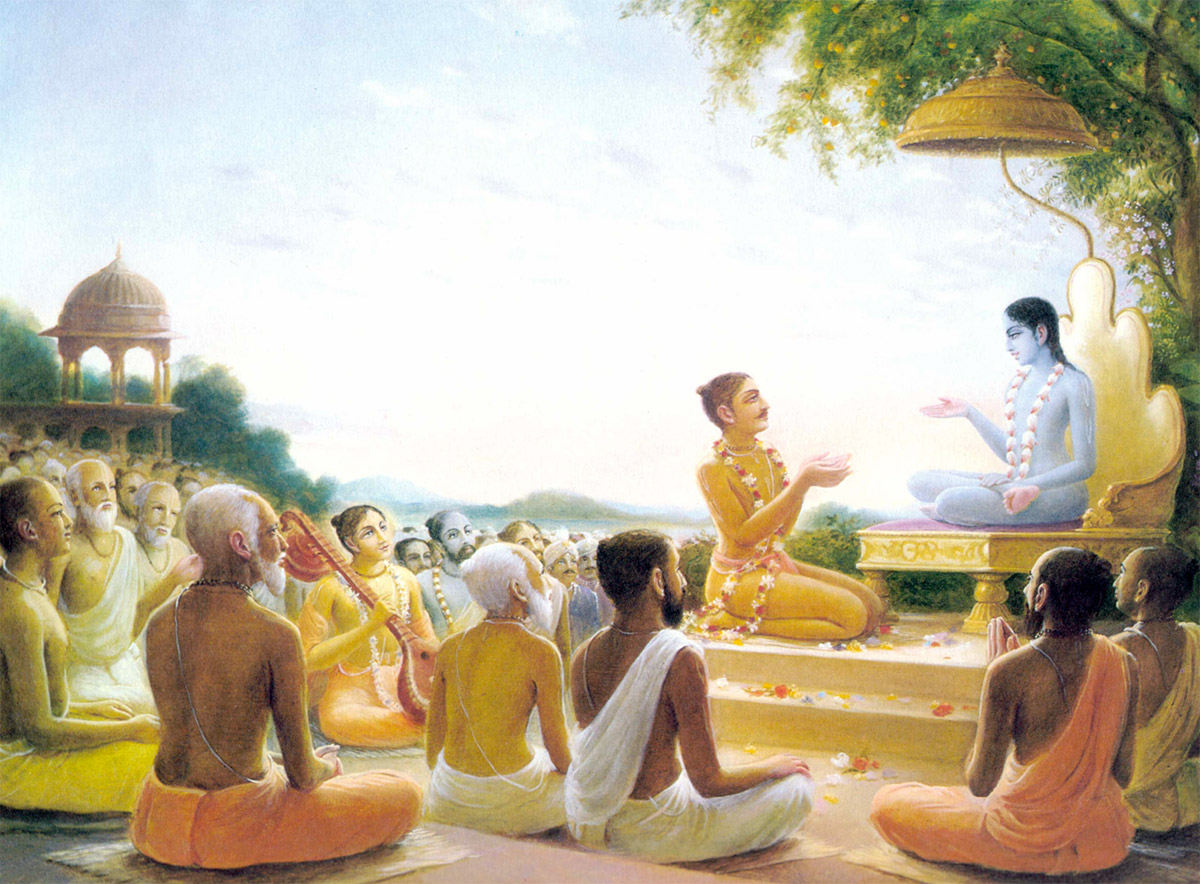
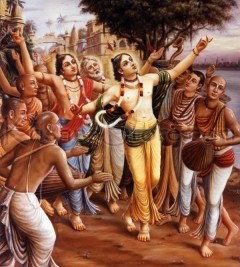
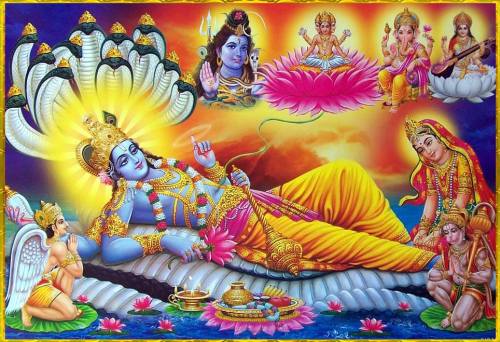
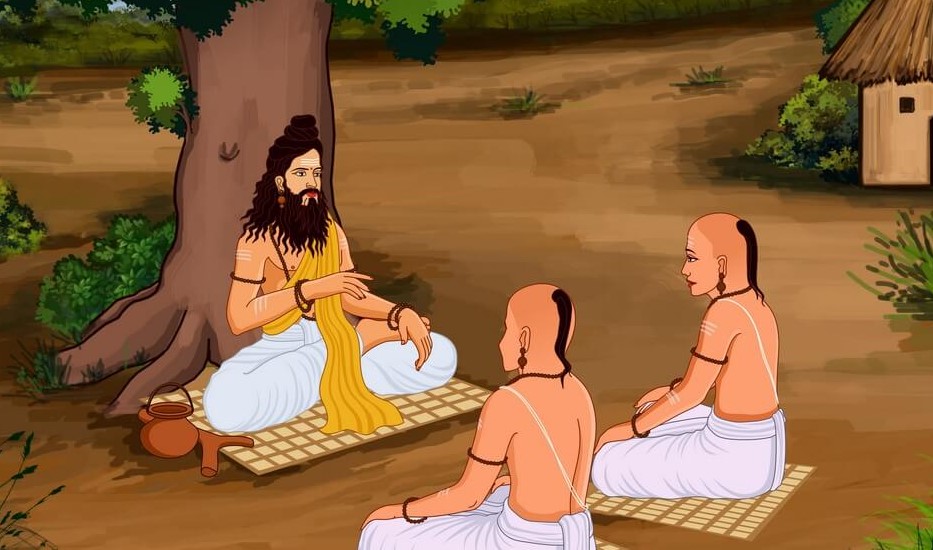
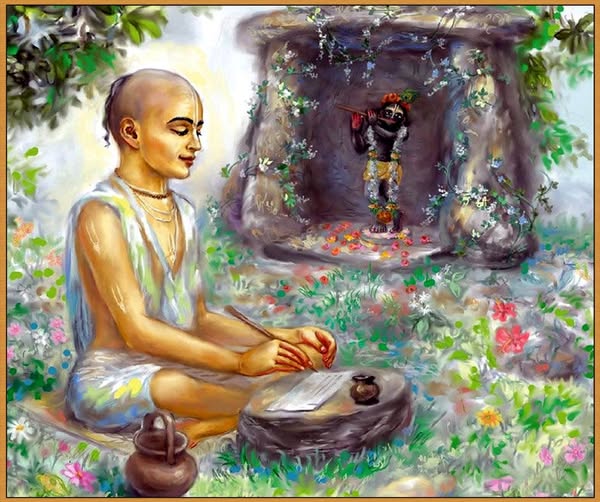
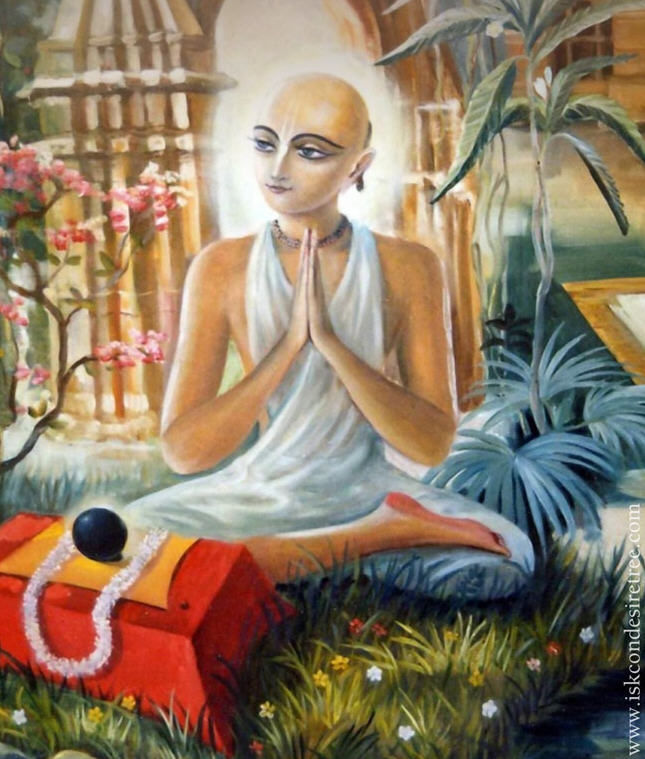
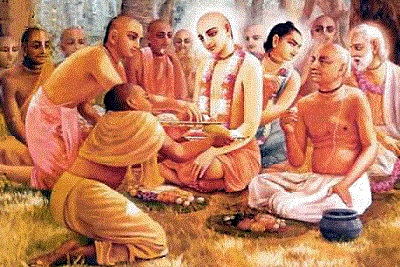
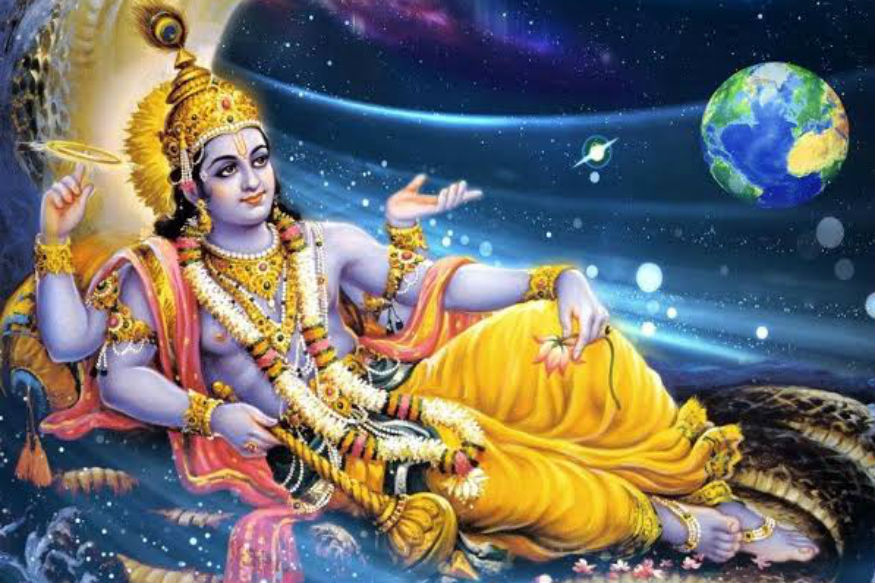
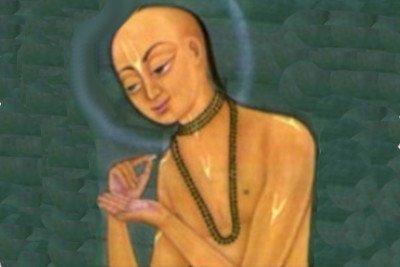
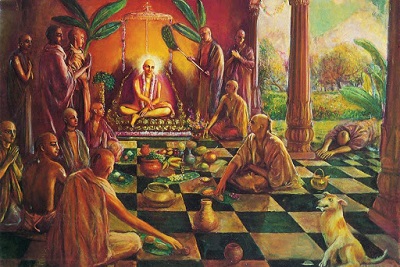
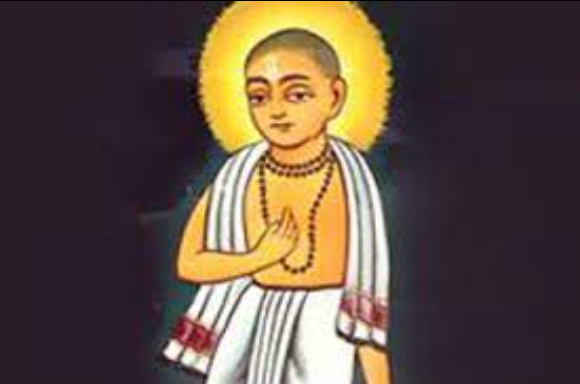
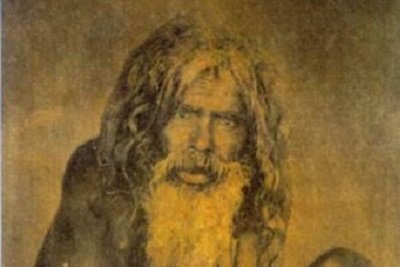
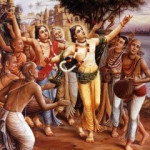
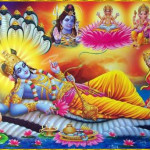
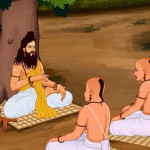
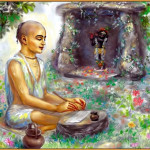
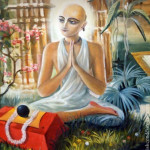
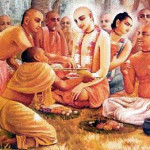
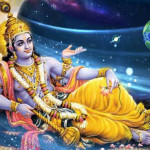
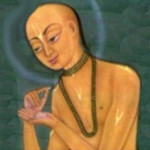
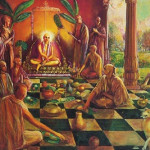
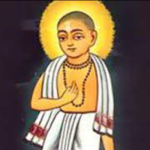









You made some decent points there. I did a search on the subject matter and found most individuals will agree with your blog.